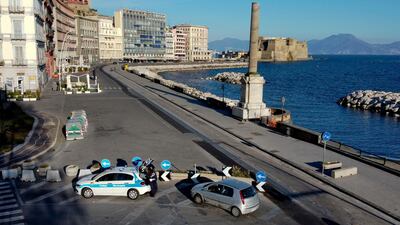Italian health officials declared a long-sought victory on Friday over the coronavirus in poorer southern regions that were less prepared for the pandemic than the wealthier north.
Prime Minister Giuseppe Conte had warned six weeks ago that Italy's ability to conquer Covid-19 depended on whether cases can stay largely contained to its northern epicentre around Milan.
The disease has now officially claimed 22,745 lives in the Mediterranean country of 60 million people - a toll second only to the United States.
But Italy has still counted itself relatively lucky because the outbreak erupted in provinces with the best equipped medical staff.
Mr Conte decided to gamble early by imposing the Western world's first peacetime national lockdown while the disease was still gathering force.
His team argued that the short-term economic pain would pay off by saving the health care system and allowing the country to gradually reopen in the weeks to come.
Italy's top health officials said on Friday that Mr Conte's big bet had paid off.
"We have prevented the spread of contagions in southern regions," public health council chief Franco Locatelli told reporters.
"This is now a fact supported by figures."
However, business leaders charge that Mr Conte is doing unnecessary damage to the economy by extending the shutdown for too long.
The latest data from Italy's civil protection service offered new reasons for Mr Conte not to extend some of the strictest measures when they expire on May 4.
They showed the number of people currently being treated for Covid-19 rising by only a few hundred for the first time since the outbreak began.
The current number of cases had been going up by at least 1,000 a day for over a month.
But they edged up by just 11 outside Milan's Lombardy region on Friday.
"In absolute terms, we have had had the highest number of recoveries since the start of the crisis," civil protection service chief Angelo Berrelli told reporters.
Mr Conte also unveiled plans to roll out a phone app that could potentially help trace coronavirus infections and further stop the spread.
The generally improving picture prompted the civil protection service to announce that it was suspending daily briefings and moving to a twice-a-week format.
New tolls will still be issued daily.
The leaders of Italy's northern industrial heartland are pushing Mr Conte to take another gamble and open as many businesses and industries as possible in early May.
The shutdown has devastated once-booming factory towns and left millions furloughed or temporarily unemployed.
Italy's central bank said industrial production had declined by 15 per cent in March and total economic output was set to contract by five percent in annual terms between January and March.
But a standoff is emerging between the northern leaders and those south of Rome.
Naples's Campania governor Vincenzo De Luca warned Friday that he may have to "close our borders" to people from the north should those regions' stay-at-home orders be lifted.
The scale of business reopening will be determined by the number of deaths and recoveries reported over the coming days.
Italy is still digging though data from individual regions to determine the true impact of its worst disaster since World War II.
Previously undisclosed figures from its public health institute revealed that nearly 17,000 medics have been infected with the virus since Italy's first Covid-19 death was recorded on February 21.
Several Italian doctors have expressed fears that infected health care workers may have been unwittingly spreading the disease to their patients in the early weeks of the outbreak.
A study released Thursday by the FNOMCeO medical association said Covid-19 has killed 125 doctors in Italy.



















